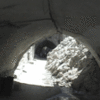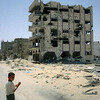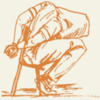
Nablus bakery
6 May 2002
During its April invasion of Nablus between 3 April and 21 April 2002, Israeli forces shelled a bakery in the old city of Nablus. Nablus was especially hard hit, especially in its old city, which contained many buildings of cultural, religious and historic significance. Much of the destruction appears to have occurred in the fighting as a result of the use by Israeli tanks, helicopter gunships and bulldozers. Read more about Nablus bakery






